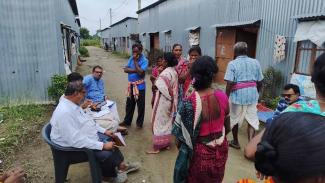The Lower Suktel Irrigation Project on Suktel River in Mahanadi basin was conceived to address the chronic issues of water scarcity, frequent droughts, and low agricultural productivity in western Odisha. The local population has been strongly opposing the project since the 1990s because of the displacement of a huge number of people. More than twelve thousand five hundred families of about 56 villages have been displaced so far and 583 hectares of forest land was submerged in the dam. The displaced people are continuing their struggle under the banner of Lower Suktel Budi Anchal Sangram Samittee. The people who lost their land and houses got unequal treatment in terms of compensation received in exchange for the same type of house and the same type, while a large number of people did not get any compensation.
Environmental activists have also raised concerns about the ecological impact of the project, which involves significant deforestation and loss of biodiversity. The reservoir's submersion zone includes forested areas that are home to various species of flora and fauna. Moreover, the dam was intended to benefit Bolangir and Sonepur districts, communities downstream of the river fear potential water shortages, this underlines the need for a comprehensive water management plan that ensures equitable distribution. The resettlement programs failed to address the socio-cultural dimensions of displacement leading to loss of a rich cultural heritage and social networks.
A team comprising Saroj Mohanty, prominent writer and Secretary of Pashim Odisha Krushak Sangathan Samannway Samiti, Biswajit from Gandhi Peace Foundation, Mahendra Parida, CPIML, Narendra Mohanty, INSAF, Odisha and Har Bania of Jai Kishan Aandolan along with Satya Banchhor, a leader of displaced people affected by this project visited the displaced/rehabilitated areas to enquire about the ground reality and status of displaced people after the inauguration of project.
Thirty five families from Bancharpali, Kondapalli, Dunguripali, Podamund were rehabilitated at Kushmel Temporary Colony in Loisingha block, and are living here for two years. Each family has been accommodated in a 15' x 12' tin house, with an attached kitchen. The roof, walls, doors and windows of this house are all made with tin plates. Without a single tree in this colony, it is impossible to imagine how people live in those houses in the scorching heat and drought situation of western Odisha. Many are unable to find new jobs in new localities, or proper educational opportunities for their children. The administration had provided assistance of Rs.3.45 lakhs to the homeless which is highly inadequate. Moreover, ration cards have not been given at the new residences depriving many from availing foodgrains in the right to food scheme. There is no hospital or school nearby that locality. On the other hand, the administration had promised to give 4 decimal lands to each displaced family which was not fulfilled.
Sudam Mallik, who lost 2 acres of agricultural land, said that "I can't forget the insult the way the government removed us. Electricity was cut off from our village. Bulldozers ran over the tube wells and houses. The government has deducted Rs 1 lakh for the temporary tin house (15 x 15 feet). All the money received was spent in construction of a house. I don't understand how to manage my family of four members, says he. According to the Right to Fair Compensation and Transparency in Land Acquisition, Rehabilitation and Resettlement Act, 2013 (Land Acquisition Act 2013), tribal people should get irrigated land as much as they have lost. The team also met with the displaced people of Ananthapalli and Kuniapali Villages.
In the case of the Scheduled Tribe community, the Forest Right Act 2006 has not been implemented. The homestead and agricultural lands were not properly evaluated by the government. All displaced people, particularly landless ones, should be given proper compensation and rehabilitation as per the law. The land and houses allocated in temporary camps must be conducive to human settlements with communication facilities, and with schools, colleges and employment opportunities. Arrangements should be made for the admission/education of all students at the government expenses in various educational institutions. This is unconstitutional to deprive families of the basic amenities who have not yet left their villages. The state and national human rights commission should pay attention to such human rights violations and take proper remedies. All eligible people should get benefits of all government schemes and the administration must provide opportunities for employment for their livelihood.











